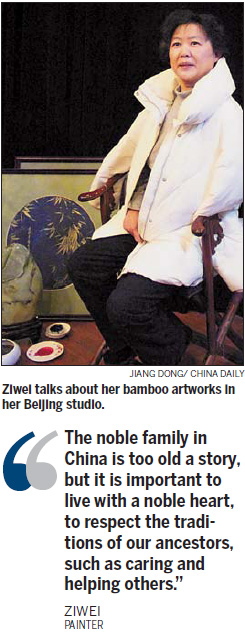Profile
Painter dabbles in noble works
By Wang Ru (China Daily)
Updated: 2010-03-01 13:48
 |
Large Medium Small |
Sitting in an antique Chinese chair of sandalwood, Ziwei brewed a pot of Chinese green tea. She moved gently, her tone of voice giving her away as someone of nobility.
The 50-year-old smoked and gazed at one of her favorite paintings of a golden bamboo shaking in the wind. At the bottom was a stamp of her full name: Aixinjueluo Yuziwei.

The Yu in her given name gives away her generation. The family name Aixinjueluo, belongs to the Manchu royals of the Qing Dynasty (1644-1911). Though the Manchu woman likes to be called Ziwei, she understands that her ancestral blood is from the Manchu royals who ruled the country for more than 250 years. Ziwei's father, Aixinjueluo Puzuo, was a cousin of Puyi, the last emperor who lost his throne when the Qing Dynasty collapsed.
Despite her royal bloodline, Ziwei prefers to live a quiet life as a painter of traditional Chinese motifs. She also prefers to let her good deeds speak louder than her name.
"The noble family in China is too old a story, but it is important to live with a noble heart, to respect the traditions of our ancestors, such as caring and helping others," she said. "The Qing Dynasty ruled the country for a long time but finally decayed and collapsed due to the corruption and blindness of the ruling class. It should be a lesson for our country and society."
Ziwei has a small art shop where she sells her paintings and antiques in east Beijing's Chaoyang district. The works, of course, are not as precious as the exhibits in the Forbidden City, where her ancestors used to live, but she loves every piece.
In her spare time, she tries to reach out and help others through her paintings. In 2001, she donated some paintings to help storm-hit areas in Inner Mongolia. Last year, She attended a charity party where she donated some of her best paintings to the children in Sichuan, which was devastated by an earthquake.
Last month, Ziwei was invited to attend the opening ceremony of the National Women and Children's Museum. She donated two paintings to the museum.
Ziwei said she is sometimes lonely but has never married and that she enjoys her life. She has many friends, including philanthropists, poets, politicians and offspring of the generals who founded New China. She accepts that all of them call her "Gege" - princess in the Manchu language.
"I am proud of my family name, since my family had great emperors such as Kangxi and Qianlong who brought long periods of prosperity to the country," she said.
Ziwei was born in Tianjin in 1960. Her father Aixinjueluo Puzuo, a famous Chinese painter specializing in painting horses, taught painting at the Tianjin Academy of Fine Arts.
She began to learn painting from her father as a child. She loves bamboos in particular. Four of her five brothers are also painters.
"In the old days, painting was also a basic skill for female royal members," she said. "Bamboo is one of the symbolic plants of Chinese culture along with the plum blossom, orchid and chrysanthemum. It has an outward pliancy and a hidden tenacity, just like Chinese women."
During the "cultural revolution" (1966-1976), many offspring of the Aixinjueluos changed their family name for fear of being attacked by the Red Guards. Her father, however, refused to do so.
"My father said we couldn't betray our ancestors," Ziwei said.
When she was 10, her parents were sent to labor camps in the outskirts of Tianjin. The family had a hard life there, sometimes without enough food to feed the children. Still, Ziwei often reminisces about the two years she spent in the camps.
"I was close to nature then. I enjoyed the feeling of playing in the fields and woods," she said.
At the beginning of the 1980s, Ziwei went to Beijing to look after her uncle. She researched how to paint bamboo and finally developed her own style of the golden bamboos, which requires a special palette to paint that is only made in Japan.
"Bamboo is a plant of serenity and elegance," said Ziwei. "In order to reflect those qualities, I need to keep a peaceful mind as well."
She likes to stay at home to work instead of traveling out to gaze at wild bamboo. Every morning, Ziwei checks her works and mulls over how to improve her style. She said she can finish a painting within several hours, but says finding inspiration is the biggest challenge.
"It is an unspeakable happiness when I finish a work that I am satisfied with," she said.
Ziwei's golden bamboo style was finally acknowledged in the 1990s. She started getting invited to a number of Chinese painting exhibitions. Her golden bamboos were by then recognized in many Asian countries. The royal family in Japan is a collector of her paintings.
But Ziwei has kept far away from the Chinese folk painting scene in Beijing, preferring to live a quiet life and create more paintings of her golden bamboos.
In recent years, TV soap operas adapted from legends of Qing Dynasty emperors have become popular, but Ziwei dislikes many of the shows.
"It is not because they hurt my feelings, but I think our popular culture sometimes is too ridiculous and irresponsible for educating the next generations to make them understand the true history. Besides, we need to learn to respect our history," she said.







